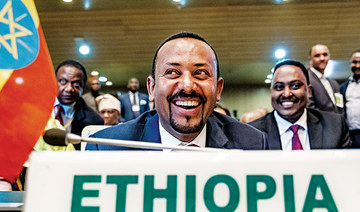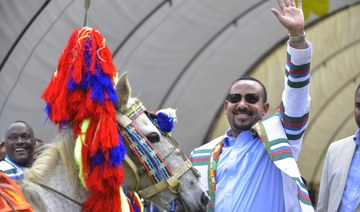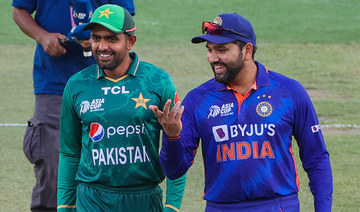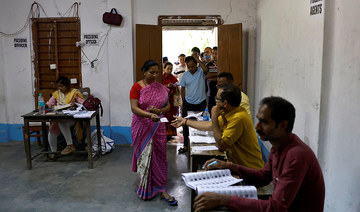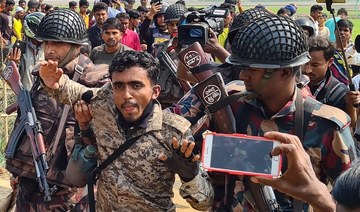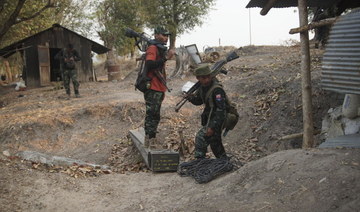ADDIS ABABA: While Ethiopian Prime Minister Abiy Ahmed was praised for efforts to end years of bitter tension with Eritrea in his Nobel Peace Prize award last week, his Eritrean partner in the peace-making has conspicuously failed to offer his congratulations.
Eritrean President Isaias Afwerki was acknowledged for accepting Abiy’s peace offer in the Norwegian Nobel Committee’s announcement, which held out hope of “positive change” in both countries. But he was not given a share of the prize and has made no public statement on the award.
That silence is consistent with the deeply isolated nation, where hopes that peace could spark domestic reform to end years of repression are fading.
Initially when Abiy and Isaias embarked on a whip-fast rapprochement last year, leading to the formal end of a 20-year-old stalemate between the countries, some analysts speculated that peace would contribute to a new era of openness.
Embassies reopened, flights were resumed and meetings held across the region, but progress has since stalled and the border between the two nations is once again closed.
Abiy, who has said he hopes his Nobel prize will inspire peace-building by other African leaders, was also lauded for an array of reforms at home, including releasing jailed dissidents and welcoming home exiled armed groups.
UN Secretary General Antonio Guterres credited Abiy as one of the main reasons why “winds of hope are blowing ever stronger across Africa.”
But little has changed in Eritrea, where a system of compulsory national service, which forces citizens into specific jobs at low pay and bars them from traveling abroad, has led to descriptions of the nation as an “open-air prison” akin to North Korea and forced thousands to flee.
Now prominent dissidents are worried that the situation is getting worse.
For Dawit, a former education official who fled Eritrea shortly before Abiy and Isaias first embraced on a tarmac in Asmara, the fact that little has changed is deeply disappointing.
“At least before there was hope. We thought maybe if there is peace, maybe if this changes, things will go the right way,” said Dawit, who wanted only his first name used for safety reasons.
“But now there is no hope. There’s nothing.”
Eritrea fought its way to independence from Ethiopia in the early 1990s, and Isaias is the only ruler the country has ever known.
For several years it enjoyed smooth relations with Ethiopia.
But in 1998 skirmishes erupted after Eritrean forces entered the area around Badme, claiming the town under borders drawn during Italian colonial rule.
Two years of fighting cost nearly 80,000 lives before the stalemate took hold in 2000.
The human rights situation in Eritrea quickly deteriorated as Isaias sought to stamp out criticism.
Eritreans continue to flee the country en masse and the country’s national service system remains in effect, forcing thousands of Eritreans into military training even before they finish secondary school.
One thing that has changed since the peace deal is Eritrea’s global standing.
The UN has lifted sanctions, and the European Union is funding a road-building project — though critics contend it relies on forced labor.
Asia Abdulkadir, a Nairobi-based Eritrean activist, said steps to bring Eritrea in from the cold alarm those who see Isaias’ isolation as “one of the things that might speed up” his exit.
Border tensions — particularly with the political party that controls Ethiopia’s Tigray region that borders Eritrea — remain as bitter as ever.
These “present a major obstacle to deepening the peace process, reducing the chances of a political opening in Eritrea,” said William Davison of the International Crisis Group think tank.
Recent months have also seen signs that the political space is shrinking.
In June, officials ordered the closure of Catholic-run health centers after church leaders published a letter expressing concern over the lack of reforms.
There are also reports of a new wave of attempts to nationalize private schools.
“The government clearly feels empowered to once again go after individuals or bodies, including the Catholic church, who have taken the risk to critique — however mildly — some of their policies and practices,” said Laetitia Bader of Human Rights Watch.
For those hoping for political change, the timeline is even more uncertain.
But Dawit, the exiled education official, said he believed the world would one day get a glimpse inside his country.
“A lot of bad things are happening in Eritrea,” he said. “One day it will come out and the world will say, ‘Wow, all of this was happening. Was it really happening?’”
Stony silence from Eritrea as Ethiopia basks in Nobel glow
Stony silence from Eritrea as Ethiopia basks in Nobel glow
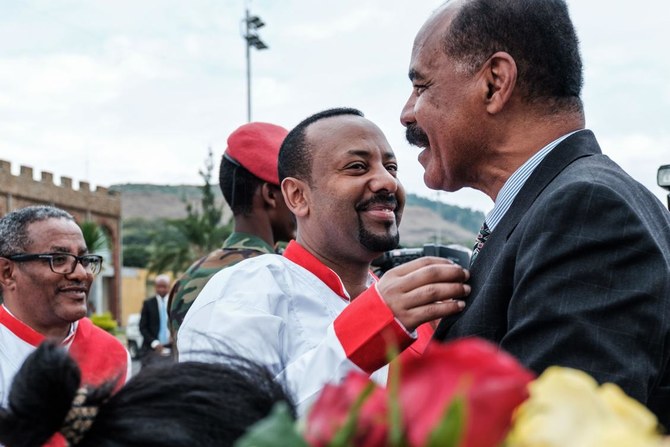
- Eritrean President Isaias Afwerki was acknowledged for accepting Abiy Ahmed’s peace offer in the Norwegian Nobel Committee’s announcement
- Afwerki has conspicuously failed to offer his congratulations to Abiy
Polish flag carrier LOT cancels Friday flights to Tel Aviv and Beirut, PAP reports

WARSAW: Polish national airline LOT canceled flights on Friday to Tel Aviv and Beirut due to the unstable situation in the region, a spokesperson was quoted as saying by state news agency PAP.
“Today’s flight 151/152 to Israel from Warsaw and to Beirut 143/144 have been canceled,” Krzysztof Moczulski told PAP. He said decisions about future flights would be made on an ongoing basis.
French police cordon off Iran consulate in Paris: se

PARIS: French police cordoned off the Iranian consulate in Paris on Friday following reports that a man was threatening to blow himself up there.
A police source told Reuters the man was seen at about 11 a.m. (0900 GMT) entering the consulate, carrying what appeared to be a grenade and explosive vest.
Police said they were at the scene and asked the public to avoid the area but provided no further details.
Service was interrupted on a nearby metro line for security reasons, the RATP metro company said.
A person at the Iranian embassy who responded to a call from Reuters declined to provide any information on the situation.
It was unclear whether the incident had any link to the escalating tensions between Iran and Israel.
Earlier on Friday, explosions echoed over the Iranian city of Isfahan in what sources described as an Israeli attack, but Tehran played down the incident and indicated it had no plans for retaliation — a response that appeared gauged toward averting region-wide war.
Blinken says US ‘not involved in any offensive operation’

- ‘All I can say is for our part and for all the members of the G7 our focus is on de-escalation’
CAPRI, Italy: US Secretary of State Antony Blinken on Friday refused to comment on reports of an attack by Israel on Iran, beyond saying Washington was “not involved in any offensive operation.”
Speaking to journalists after a meeting with G7 counterparts in Italy, he declined to answer repeated questions about explosions in Iran, and reports that Israel had carried out retaliatory strikes.
“I’m not going to speak to these reported events... All I can say is for our part and for all the members of the G7 our focus is on de-escalation,” Blinken told a press conference on the island of Capri.
“The US has not been involved in any offensive operation,” he said.
Speaking to reporters earlier, G7 host Antonio Tajani, the foreign minister of Italy, said Washington had been informed in advance of the strikes, without giving details.
“The United States were informed at the last moment,” he said, adding that “it was just information” passed on — without saying who by.
The reports dominated the G7 Friday, with Tajani forced to change the agenda, but little public information emerged.
In its final statement, the Group of Seven ministers said: “In light of reports of strikes on April 19th, we urge all parties to work to prevent further escalation. The G7 will continue to work to this end.”
Israel had warned it would hit back after Iran fired hundreds of missiles and drones at Israel almost a week ago, in retaliation for a deadly strike — which Tehran blamed on its foe — that levelled Iran’s consular annex at its embassy in Syria.
Indians head to the polls in world’s biggest election
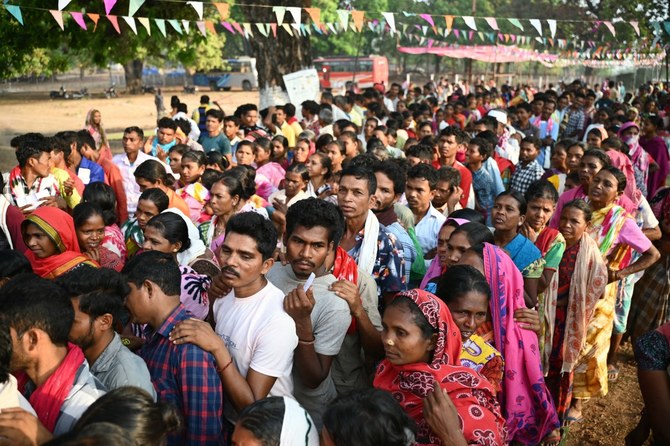
- Polling takes place in phases over the next six weeks, with results expected on June 4
- Over 968 million people are registered to vote, with 168.6 million casting ballots on Friday
NEW DELHI: Indian voters headed to the polls on Friday for the first phase of the world’s biggest general election, in which Prime Minister Narendra Modi is aiming for a rare third consecutive term.
More than 968 million people are registered to vote, with polling taking place over the next six weeks, as results are expected on June 4.
After April 19, the other voting dates will be April 26, May 7, May 13, May 20, May 25 and June 1, with some states completing the process on a single day, and others having it spread out in several phases.
Friday’s polling was held in 21 states and union territories, including the most populous ones such as Uttar Pradesh, Bihar, Rajasthan, Tamil Nadu, and Maharashtra, as well as smaller northeastern states and the northern Himalayan territory of Jammu and Kashmir.
In Kashmir, this is the first election since its special autonomous status and statehood were scrapped through the Indian government’s controversial constitutional amendment in 2019.
Chief Election Commissioner of India Rajiv Kumar told reporters on Friday that 168.6 million people were expected to cast their ballots on Friday.
“The preparations started, actually, two years back. Wide range of preparations … It’s a tremendous exercise,” he said.
MAIN CONTENDERS
More than 2,600 political parties are registered in the marathon election and 543 contested seats in the lower house of Parliament. The party or coalition that wins at least 272 is going to form the government.
Modi is targeting 400 seats for the National Democratic Alliance led by his Hindu nationalist Bharatiya Janata Party, which has been in power since 2014.
He is challenged by an alliance of two dozen opposition parties — the Indian National Developmental Inclusive Alliance, or INDIA, led by the Congress Party, which has ruled the country for close to 45 years since its independence in 1947.
The key leader of the opposition coalition is Rahul Gandhi — the son of Rajiv Gandhi, a grandson of Indira Gandhi, and a great-grandson of Jawaharlal Nehru, all of whom served as prime ministers of India.
While the opposition is trying to appeal to Indian youth with promises to tackle unemployment, free education and medical facilities, the BJP has deployed the same tactics as in previous polls — by mobilizing voters through majoritarian Hindu sentiment, despite constitutional provisions that make it a secular state.
Opinion polls show Modi as frontrunner, with 48 percent of respondents in the most recent survey released by the Centre for the Study of Developing Societies last week naming him as their choice for the prime minister. Gandhi was second, preferred by 27 percent.
“Modi has created an image of a powerful leader, a leader who is not only popular in India but outside too. He has also created an image of not pandering to Muslim communities in India … This image of a leader who does not appease the Muslim sentiments appeals to the Hindu masses. Politics of polarization helps Modi to build an image and aura among a large section of the Hindu voters,” Prof. Venkat Narayan, political analyst and commentator, told Arab News.
“Then the use of social media and the mainstream media is also there to create an image and broaden Modi’s appeal. The media plays a great role in creating this image, they are soft towards Modi and do not ask critical questions.”
If Modi wins the election, he will become the second prime minister, after Nehru, to succeed in three consecutive polls.
“Modi is leading in the polls as he has created an image of doing a lot for different sections of the society. Besides, he projects himself as squeaky clean. People also think that as he has no children, he has no reason to be corrupt or be on the take,” Sanjay Kapoor, analyst and editor of the English-language political magazine Hardnews, told Arab News.
“There are other reasons for his popularity, which include adroit use of media and social media that control all criticism against him. Then there are issues of raising India’s global profile and pursuing an independent foreign policy.”
FUTURE FOREIGN POLICY
Whoever wins the election, the foreign policy direction is likely to remain broadly unchanged, except for India’s orientation toward Israel and Palestine.
Support for Palestine and Palestinian statehood was once an integral part of India’s foreign policy, but in recent years, under Modi’s rule, New Delhi has become closer to Tel Aviv, despite civil society protests breaking out across the country against Israel’s deadly war on Gaza.
“If the INDIA alliance comes to power, then we may see a change in our policy towards Israel and Palestine. The INDIA alliance is sympathetic to Palestinians,” Kapoor said.
“We expect that the INDIA alliance will also restore ties with neighbors like Pakistan, (and) revive SAARC (South Asian Association for Regional Cooperation).”
The member states of SAARC — a regional intergovernmental organization and geopolitical union of states in South Asia — are Afghanistan, Bangladesh, Bhutan, India, Maldives, Nepal, Pakistan, and Sri Lanka.
The last biennial SAARC summit was hosted by Nepal in 2014. Pakistan was to host the summit in 2016, but it was stalled after India refused to participate, following an attack on an Indian army camp in Kashmir that New Delhi blamed on Pakistan-based militants.
VOTERS’ CONCERNS
According to the Centre for the Study of Developing Societies survey, unemployment emerged as the top concern for 27 percent of respondents.
Some 62 percent also said it has been more difficult to find a job in the last five years — during Modi’s second term in office.
“The biggest concern remains inflation and unemployment. The possibility of getting a job decreases if you study more. People are forced to leave India in search of jobs. Some have even gone as far as Russia and Israel,” Kapoor said. “The situation is really dismal.”
Rising prices and inflation were also a major issue — the top concern for 23 percent of the people surveyed by the CSDS.
“Women and the middle class are concerned about the rising prices. Modi is trying to divert attention from these main issues by talking about religion and temples,” said Shashi Shekhar Singh, associate professor at Satyawati College at the University of Delhi.
The CSDS pre-poll also revealed that despite the ruling party’s narrative promoting Hindu nationalist dominance to establish a majoritarian state in India, only 11 percent of respondents saw India as solely for Hindus.
But there were fears the reality on the ground could change if the BJP tried to amend India’s liberal and democratic constitution.
“Indian secularism and the very idea of a plural democracy is at stake,” Singh said.
“There is a fear that if the BJP comes to power with the thumping majority, the liberal and secular democracy will breathe its last. The BJP might lead the nation further down the path of a Hindu majoritarian state.”
ASEAN says ‘deeply concerned’ over escalating Myanmar violence
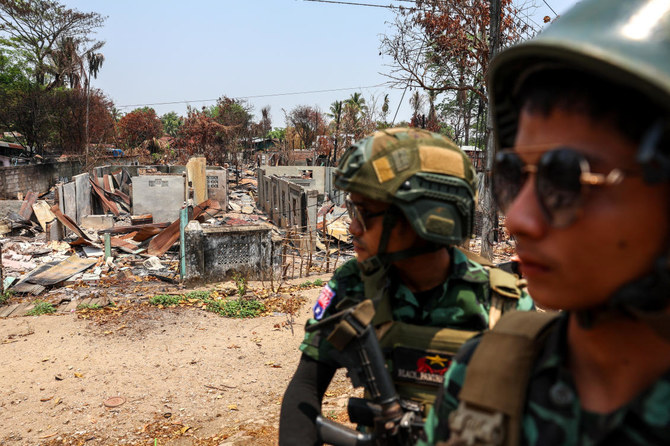
- ASEAN foreign ministers urge ‘all parties for an immediate cessation of violence’ in Myanmar
BANGKOK: Regional bloc ASEAN said it is “deeply concerned” about a recent upsurge in fighting in Myanmar, after fierce clashes over a key trading hub near the Thai border.
The foreign ministers of the Association of Southeast Asian Nations urged “all parties for an immediate cessation of violence” in Myanmar, which has been roiled by conflict since the military seized power in a February 2021 coup.
The ministers’ statement issued late Thursday said ASEAN was “deeply concerned over the recent escalation of conflicts, including in the area of Myawaddy.”
The military was last week forced to pull its troops out of positions in the valuable trading post after days of battling with the Karen National Union (KNU) — a long-established ethnic minority armed group — and other anti-junta fighters.
It was the latest blow suffered by the junta, which has suffered a string of battlefield losses in recent months, with some analysts warning it is its most significant threat to date.
Myawaddy is Myanmar’s main trade link to Thailand, and usually sees over a billion dollars worth of trade annually.
The clashes saw people flee across the border into Thailand — from where gunfire and the boom of artillery barrages could be heard.
Thailand has said it is ready to receive people from Myanmar, though the kingdom’s foreign minister warned it would not tolerate any violation of its sovereignty.



